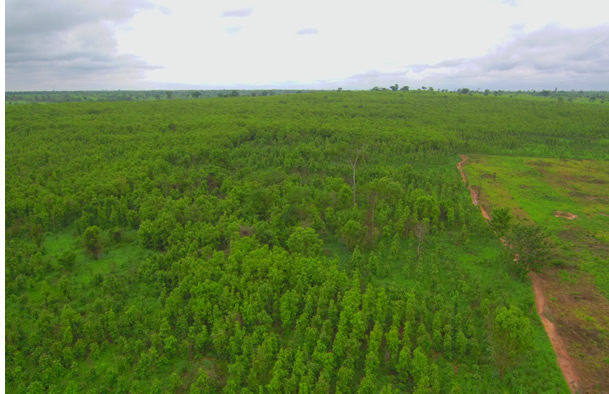The Green Climate Fund (GCF) has approved a project worth $54.5 million to address the alarming deforestation and forest degradation challenges in the Northern Savannah Zone of Ghana, whilst promoting investments in the shea value chain and women’s empowerment.
The ‘Ghana Shea Landscape Emission Reductions Project’, which was approved at the ongoing GCF’s 26th virtual Board Meeting, will be implemented by the Forestry Commission (FC) of Ghana with technical support from the United Nations Development Programme (UNDP), in partnership with multiple national and local institutions, civil society organizations and private sector actors.
The project has leveraged vertical funds, with USD 30,100,000 grant from the GCF, about USD 15 million funding from the Government of Ghana and mobilized about USD 9 million impact investments from the private sector in the shea value chain.
‘’I welcome this great milestone in Ghana’s Forestry Sector in the deployment of programmes and projects that reduce emissions from deforestation and forest degradation, build ecosystem resilience and also enhance the lives of communities that nurture the forests’’, stated the Chief Executive of the Forestry Commission, John M. Allotey.
John Allotey highlighted how the implementation of the project would provide a strong contribution to Ghana’s achievement of its commitment to the Paris Agreement on Climate Change and the implementation of the Ghana National REDD+ Strategy.
He also emphasized the FC’s appreciation to all the stakeholders involved in this victory, particularly the UNDP, and the Ministry of Finance which is the National Designated Authority (NDA) for the GCF.
The project’s interventions are expected to result in the restoration of 200,000 hectares of off-reserve savanna forests and 300,000 hectares of degraded shea parklands as well as the establishment of 25,500 hectares of forest plantations in severely degraded forest reserves.
It is expected that the activities will result in an estimate of over 6 million tCO2e in emission reductions and removals over the first seven years of the project’s lifetime and 25.24 million tCO2e over 20 years.
“Shea landscapes are important sources of carbon storage and sequestration and these provide essential products and ecological services. GCF’s approval of this project is a welcoming news as this will help in restoring degraded landscapes and contribute to building a resilient economy that is capable of withstanding shocks without putting Ghana’s development agenda in jeopardy”, said Roselyn Fosuah Adjei, Director of Climate Change and National REDD+ Focal Point, Forestry Commission of Ghana.
Roselyn Adjei added that this impressive result could not be achieved without the support provided by the Italian Ministry of Environment, Land and Sea (IMELS) for the elaboration of the project proposal through the Global Italian initiative On REDD+ National Implementation (GIORNI).
Among other benefits, the ‘Ghana Shea Landscape Emission Reductions Project’ will also bring about a breakthrough in the shea sector by enhancing revenue generation for women and strengthen the livelihoods of over 500,000 people in Northern Ghana.
The Global Shea Alliance (GSA), a non-profit industry association with 500 members from 35 countries, will be a key partner during the project implementation.
Simballa Sylla, the GSA President said: “this is a historic and defining moment for the shea industry in Ghana. The newly approved project will not only contribute to protecting rural communities from climate change consequences.
"It will ensure that livelihoods of hundreds of thousands of Ghanaian families are improved, and that the shea industry is supported in its growth”.
“We are particularly happy with the approval from the GCF Board because of how critical this project is in reducing emissions, the expected value additions in the utilization of forest resources and contributions to livelihood improvement especially for women”, noted Silke Hollander, Deputy Resident Representative for UNDP in Ghana.
The project is aligned with the main climate change and forestry-related policies, strategies and plans of Ghana, and this was highlighted by the President Nana Addo Dankwa Akufo-Addo during the National REDD+ (Reducing Emissions from Deforestation and Forest Degradation) Forum as having “the potential to transform the Northern Savanna ecosystem of Ghana with the right implementation and enforcement structures”.
Latest Stories
-
EBID wins the Africa Sustainability Award
55 minutes -
Expansion Drive: Takoradi Technical University increases faculties
5 hours -
SHS heads demand payment of outstanding funds before reopening of schools
6 hours -
We thank God for the 2024 general elections – Akufo-Addo
6 hours -
Coconut Grove Beach Resort marks 30 years of excellence with memorable 9 lessons & carols service
6 hours -
WAFU B U-17 Girls’ Cup: Black Maidens beat Nigeria on penalties to win inaugral tournament
7 hours -
Real Madrid beat Sevilla to keep pressure on leaders Atletico
8 hours -
Liverpool put six past Spurs to go four points clear
8 hours -
Manchester United lose 3-0 at home to Bournemouth yet again
8 hours -
CHAN 2024Q: ‘It’s still an open game’ – Didi on Ghana’s draw with Nigeria
8 hours -
CHAN 2024Q: Ghana’s Black Galaxies held by Nigeria in first-leg tie
9 hours -
Dr Nduom hopeful defunct GN bank will be restored under Mahama administration
10 hours -
Bridget Bonnie celebrates NDC Victory, champions hope for women and youth
10 hours -
Shamima Muslim urges youth to lead Ghana’s renewal at 18Plus4NDC anniversary
11 hours -
Akufo-Addo condemns post-election violence, blames NDC
11 hours

